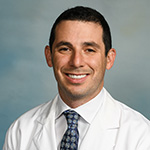 Adam Baumgarten, M.D. is a physician who specializes in genitourinary reconstruction, urologic trauma, and prosthetic urology. He joined the UAB Department of Urology after completing training at the University of South Florida followed by a fellowship in urologic trauma, reconstruction, and prosthetics at the University of Texas Southwestern Medical Center. He underwent advanced training in the treatment of urethral stricture disease, erectile dysfunction, male stress urinary incontinence, Peyronie’s disease, ureteral stricture disease, genitourinary trauma, and genitourinary fistulas. Baumgarten also has a concentration in performing operations such as urethroplasty surgery, penile prosthesis placement, artificial urinary sphincter and male transobturator sling placement, and both robotic and open urinary tract reconstruction.
Adam Baumgarten, M.D. is a physician who specializes in genitourinary reconstruction, urologic trauma, and prosthetic urology. He joined the UAB Department of Urology after completing training at the University of South Florida followed by a fellowship in urologic trauma, reconstruction, and prosthetics at the University of Texas Southwestern Medical Center. He underwent advanced training in the treatment of urethral stricture disease, erectile dysfunction, male stress urinary incontinence, Peyronie’s disease, ureteral stricture disease, genitourinary trauma, and genitourinary fistulas. Baumgarten also has a concentration in performing operations such as urethroplasty surgery, penile prosthesis placement, artificial urinary sphincter and male transobturator sling placement, and both robotic and open urinary tract reconstruction.
1. What lead you to pursue a career in medicine?
After my brother had surgery to remove a brain tumor in 2002, my family’s life changed forever. This experience ushered in a lifelong journey for all of us and my journey to becoming a physician started. I began to witness first-hand the extraordinary power of medicine.
2. At what point in your medical career did you decide to specialize in reconstructive urology?
I decided to specialize in reconstructive urology as a third-year resident. I was lucky to be exposed to reconstructive urology early during my urologic residency. I really enjoyed the subtle complexities of reconstructive surgery; surgeries that did not follow a pathway or algorithm, but instead were each independently different. I appreciate being challenged during cases, having to think two steps ahead, and being willing to adapt.
3. What are some of your current research projects that you are working on and/or aspirations?
Current projects include studying ways of decreasing infections in penile prosthesis surgery, evaluating new technologies for urethral stricture disease after radiation therapy, and evaluating health disparities in our urethral stricture population
4. What do you believe should have more awareness and attention in the field of urology, besides more well-known diseases like prostate cancer?
Erectile dysfunction and male stress urinary incontinence. Many men are embarrassed to discuss these issues with their physicians, but there are treatments that we can offer other than medications that will restore patients’ quality of life.
5. What major changes in the field do you feel could be implemented in the foreseeable future?
We continue to push the limit with minimally invasive and robotic surgery. Many surgeries that used to require large incisions and multiple-day hospital stays are now being offered with one (or a few) small incisions in an outpatient manner. I see this only becoming more and more common over time.